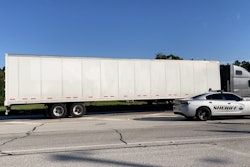Trucking news and briefs for Wednesday, May 8, 2024:
FMCSA extends Key Bridge emergency declaration
The Federal Motor Carrier Safety Administration on Tuesday extended the emergency declaration that was issued in the aftermath of the Francis Scott Key Bridge collapse in Baltimore.
The declaration was first issued by Maryland Gov. Wes Moore on March 26, the day of the collapse. Due to FMCSA regulations, emergency declarations from state governors can only be effective for 14 days. As such, FMCSA extended the declaration on April 4 through May 8. Now, the agency is extending the declaration for another month, through June 8.
As reported, the extension applies to operations providing direct assistance supporting emergency relief efforts related to the collapse of the bridge and partial closure of the Port of Baltimore. Direct assistance does not include transportation related to long-term rehabilitation of damaged physical infrastructure or routine commercial deliveries, after the initial threat to life and property has passed, FMCSA noted, or mixed loads with a nominal quantity of qualifying emergency relief added to obtain the benefits of this emergency declaration.
Direct assistance includes:
- Transportation related to the immediate restoration of essential services at the Port of Baltimore.
- Transportation of commodities re-routed due to the disruptions to vessel traffic into the port, subject to the restrictions and conditions set forth in the extension.
- Transportation of fuel (gasoline, ethanol, propane, natural gas, and heating oil) from Maryland’s Curtis Bay terminal (within the Baltimore Marine Terminal area) for delivery to the following locations within Maryland: Anne Arundel County, Baltimore City, Baltimore County, Carroll County, Cecil County, Frederick County, Harford County, Howard County, Queen Anne’s County, and Washington County.
Carriers and drivers transporting equipment and supplies related to immediate repairs to the roadways and navigable waterways adjacent to the Port of Baltimore and transportation related to the removal of wreckage and debris from the navigable waterways providing access to the Port of Baltimore are granted emergency relief from the maximum driving time regs is 49 CFR Part 395.3.
Drivers transporting re-routed commodities are allowed up to two additional hours on their daily maximum driving time, along with drivers transporting fuel in the areas specified above.
The full declaration can be found here.
“FMCSA intends to continually review the status of the emergency, including the status of the partial closure of the Port of Baltimore and adjacent navigable waterways and the relief granted under this Extension of Emergency Declaration,” the agency said. “As necessary, FMCSA may take action to modify this Extension of Emergency Declaration, including modification of the transportations and commodities covered by the Emergency Declaration, and to extend or terminate the Emergency Declaration if conditions warrant.”
[Related: FMCSA explains the HOS waivers around Baltimore's bridge collapse]
Bill requiring accident reporting from USPS contractors passes U.S. House
A bill that would require the United States Postal Service to increase its oversight of trucking contractors passed in the U.S. House last week.
The bipartisan bill, dubbed the Mail Traffic Deaths Reporting Act, would require USPS to collect, track, and publicly report information related to deaths and injuries resulting from traffic crashes involving vehicles transporting mail. It was introduced by Rep. Gerry Connolly (D-Virginia) and co-sponsored by Rep. James Comer (R-Kentucky).
According to a press release from Connolly, over the last three years at least 79 people have been killed in crashes involving trucks contracted by the Postal Service. The Wall Street Journal has also reported that USPS did not track and report serious crashes involving its trucking contractors.
“For too long, the Postal Service has taken an ‘out of sight, out of mind’ approach to truck safety,” Connolly added. “This legislation is about saving lives and protecting families on our nation’s roads. I am thrilled we’ve taken this big step toward getting it to the President’s desk, and I want to thank Chairman Comer for his continued partnership on that front.”
In May 2023, Connolly urged the USPS Office of Inspector General (OIG) to investigate the safety of freight contract trucking practices at the Postal Service. The OIG released a report in response to Connolly’s request, which found that the Postal Service doesn’t have a written policy requiring the tracking of trucking contractor accidents and fatalities.
The OIG’s No. 1 recommendation was that USPS establish a method for tracking contractor accident and fatality data and establish corresponding written policies and procedures for such a tracking system.
The Mail Traffic Deaths Reporting Act would codify that recommendation by requiring the tracking and reporting of serious crashes and fatalities related to the transport of U.S. postal mail.
Under terms of the legislation, crash reports submitted to USPS would be required to include detailed information describing, at a minimum, the crash -- including the date, time, location, nature of the crash -- information identifying the contractor, number of injuries, fatalities, and any contributing factors to the crash.
USPS would also be required to maintain an updated internal database that includes information related to injuries and deaths from crashes involving vehicles transporting mail, as well as release an annual public report summarizing fatal and injury crash data.
Contractors who don’t report crashes within the deadlines outlined by the bill would be subject to “appropriate penalties,” including fines, suspension of contracts or termination of contracts.
Our Roads, Our Safety campaign ongoing this week
The Federal Motor Carrier Safety Administration (FMCSA) is raising awareness and sharing actionable information to help improve road safety by kicking off its annual Our Roads, Our Safety Week campaign Monday.
Ongoing since Monday, May 6, the safety week observance is dedicated to educating truckers and other commercial drivers, as well as all other roadway users, on sharing the road safely.
“We appreciate the role truck and bus drivers have in supporting a healthy economy and connecting us from coast to coast,” said FMCSA Acting Deputy Administrator Sue Lawless. “This campaign is a reminder for those drivers -- and all who share the road with them -- to focus on safety as they navigate the nation’s roadways.”
The Our Roads, Our Safety Week spotlights a key road user each day of the week and disseminates resources, tips and reminders that can help them share the road safely. FMCSA’s Our Roads, Our Safety Week Toolkit includes shareable materials that can help spread life-saving road safety messages across various mediums.
FMCSA is also hosting a free transportation safety fair Wednesday, May 8, at U.S. DOT headquarters in Washington, D.C. It's open to all ages, and the outdoor event will offer interactive exhibits, driving simulators, and engaging educational activities.
The Our Roads, Our Safety Week campaign comes just one week before another educational-outreach event with more at stake short-term for drivers and carriers in the Commercial Vehicle Safety Alliance's Roadcheck inspection blitz. The focus this year: drug and alcohol possession and effective tractor protection systems in the event of air loss.
[Related: How to pass a roadside inspection: CVSA answers Roadcheck questions]













